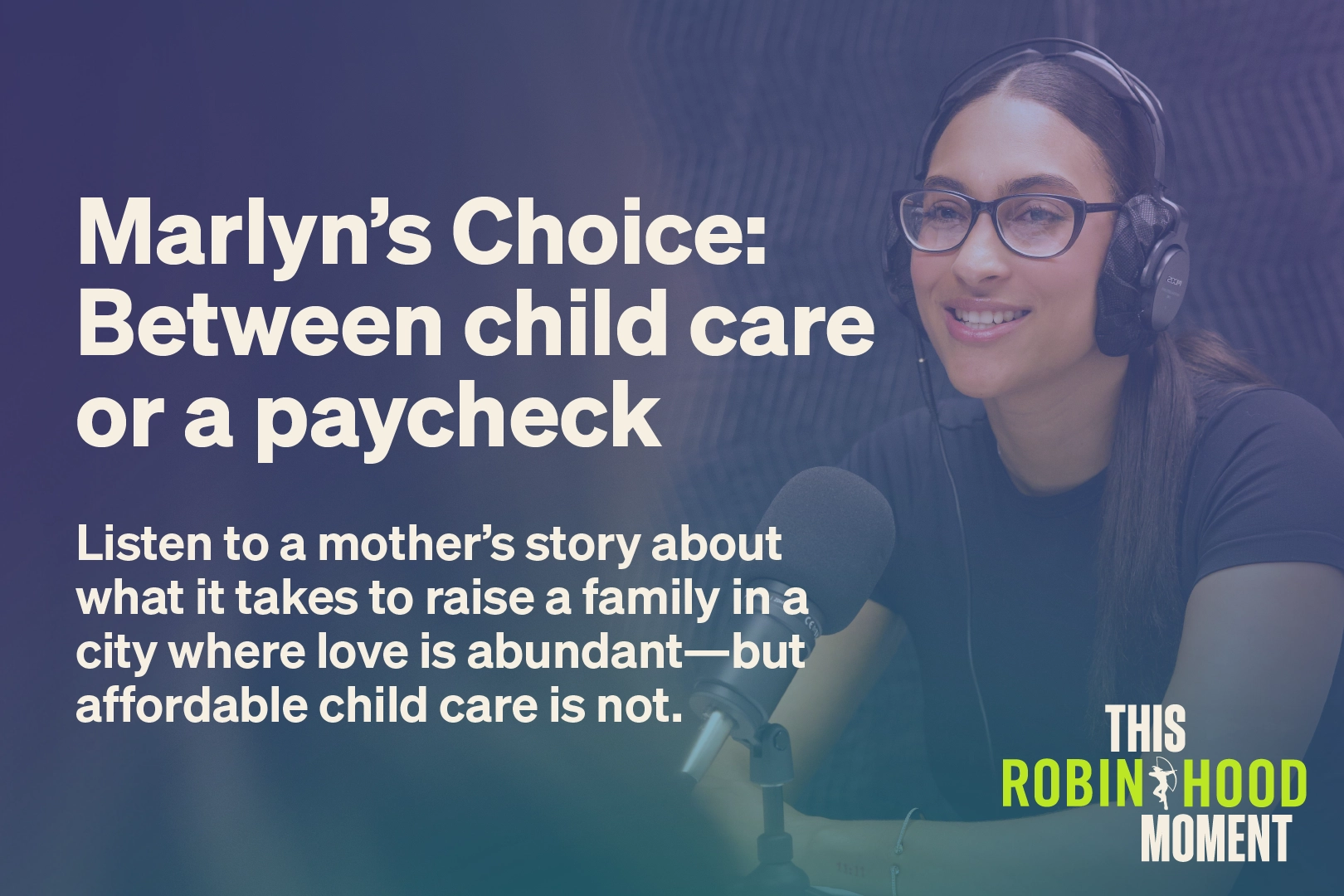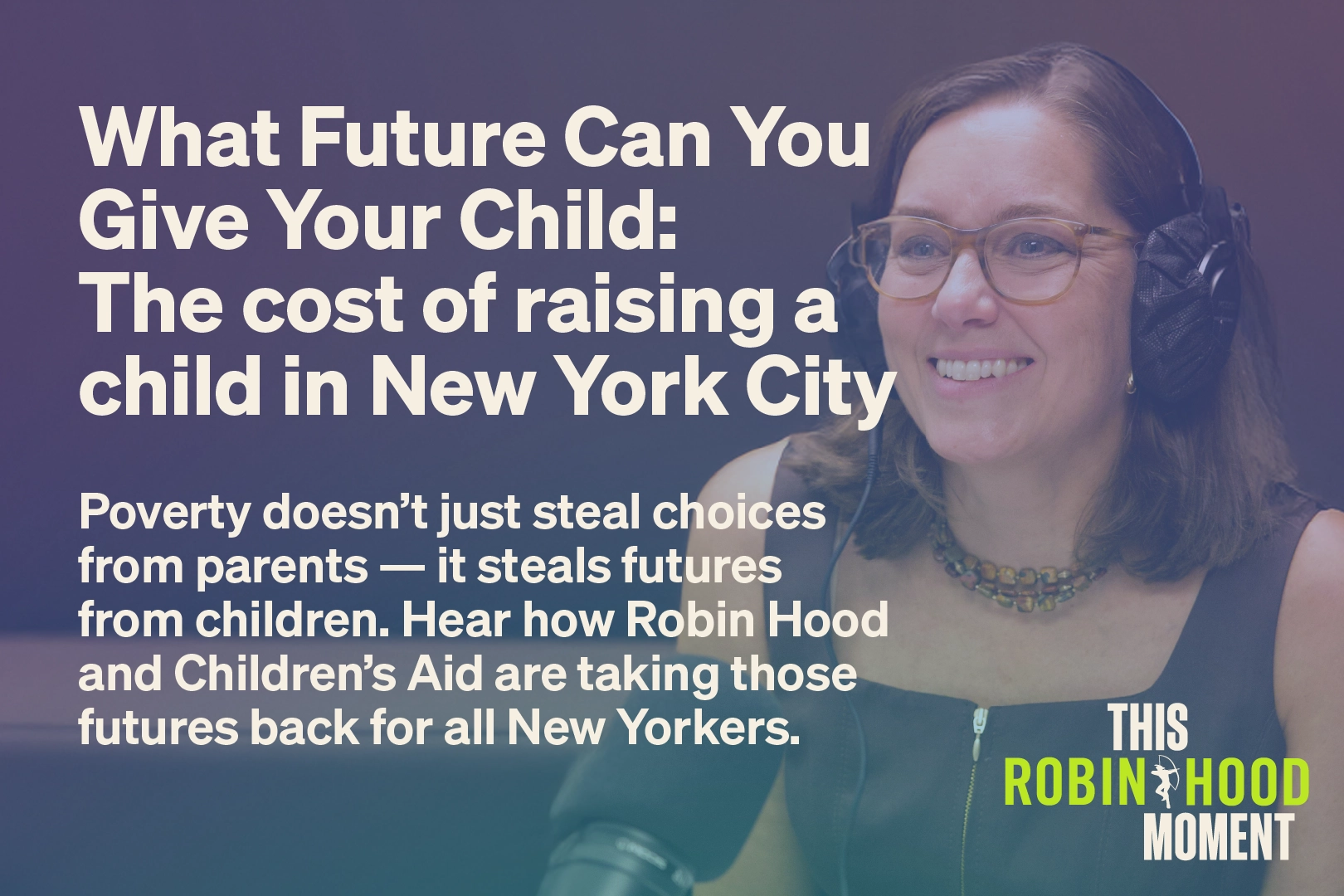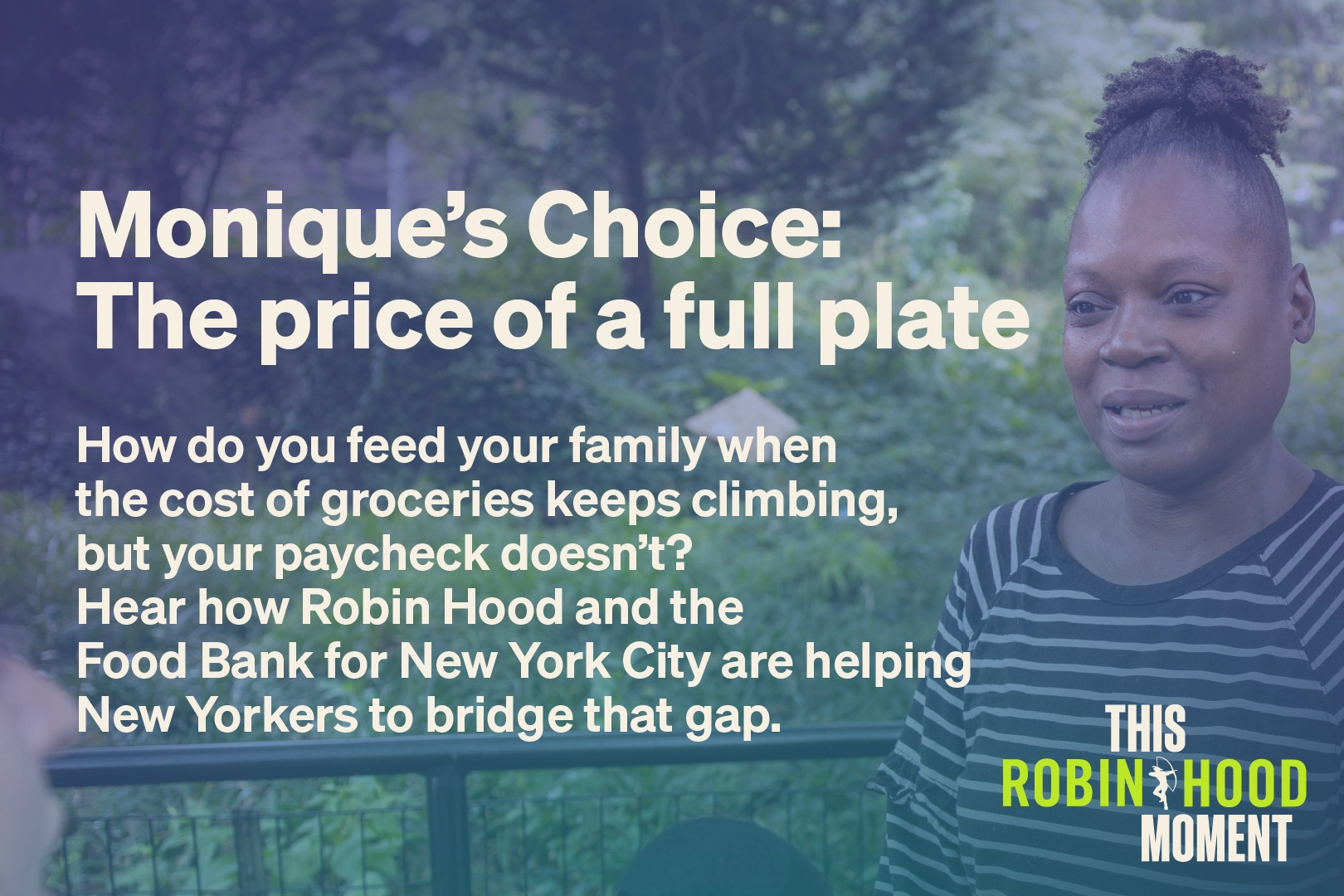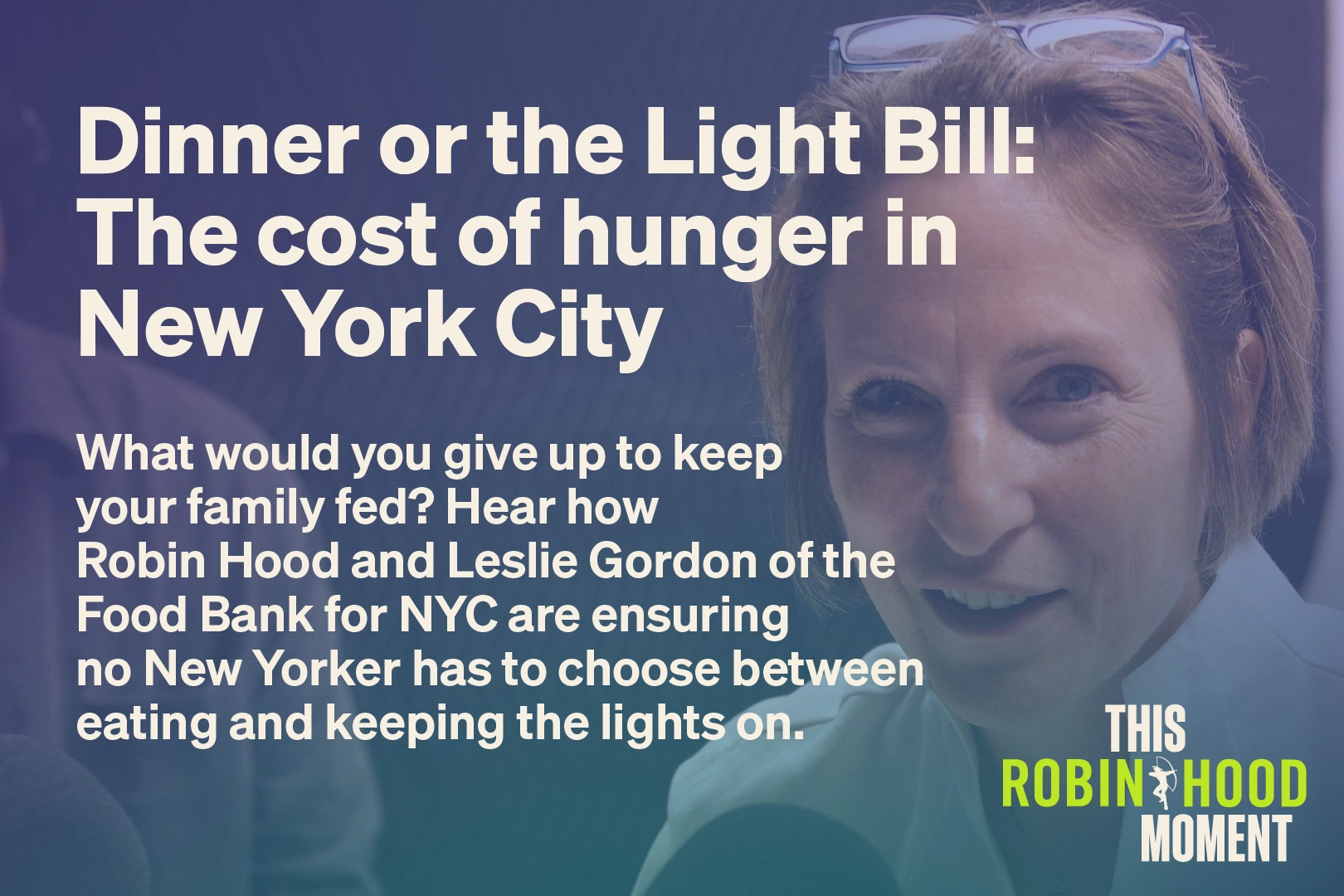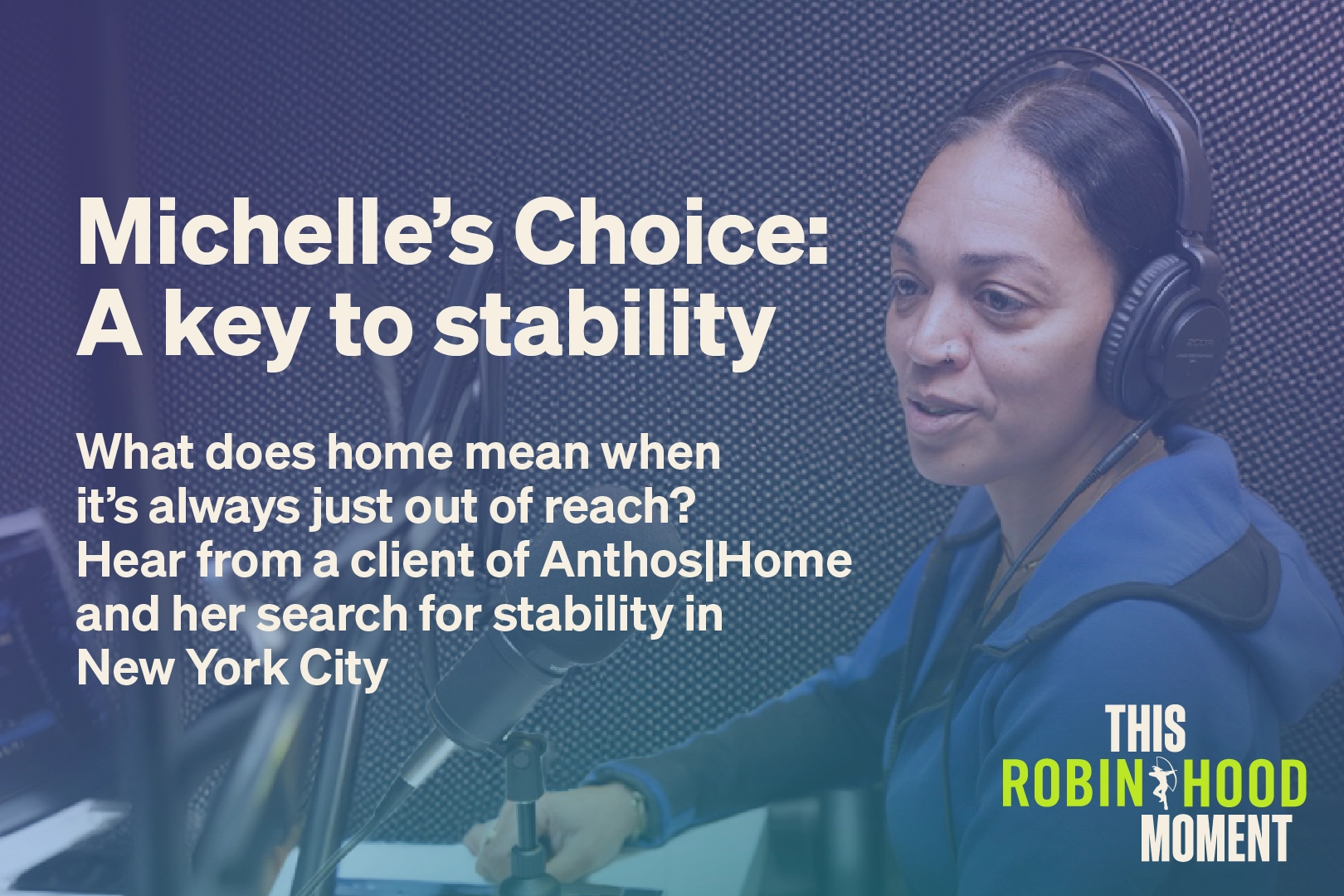Nov 20, 2025
Marlyn’s Choice: Between child care and a paycheck (Bonus Episode) | This Robin Hood Moment
What does it mean to build a future when every decision feels like a tradeoff? In this bonus episode of "This Robin Hood Moment," we meet Marlyn, a mother of two from Washington Heights, navigating the daily costs of parenting in New York City — balancing rent, child care, and the dreams she holds for her children’s future.
Listen and Subscribe: Apple Podcasts | Spotify | iHeart | YouTube
What does it mean to chase opportunity when every step forward comes with a sacrifice?
In New York City, the high cost of child care forces many parents—especially mothers—to make impossible choices between earning a living and being there for their children. For Marlyn, a mother of two in Inwood, balancing work, childcare, and her dreams for her family means constantly negotiating what she can afford to give up.
In this episode, Marlyn shares her story of resilience and resourcefulness as she works to build a better life for her kids with support from Children’s Aid, a Robin Hood grantee providing early childhood education and family services across the city. Her story reveals what it really takes to raise a family in a city where love is abundant—but affordable child care is not.
Thoughts? Guest suggestions? Email us at info@robinhood.org.
“This Robin Hood Moment” is hosted by Kevin Thompson and Crystal Cooper. The show is produced and edited by Cory Winter, with graphic design by Mary Power. Additional motion graphics and footage are provided by Motion Array. Our theme music is from Epidemic Sound.
The views and opinions expressed by external podcast speakers and guests are solely their own and do not reflect the opinions of Robin Hood or its personnel, nor does Robin Hood advocate or endorse any individuals or entities featured on the episodes.
TRANSCRIPT
This transcript was prepared by a transcription service. This version may not be in its final form and may be updated.
Cory Winter: What does it mean to chase opportunity when every step forward comes with a sacrifice?
In New York City, that question isn’t abstract—it’s the daily math of parenting. Groceries or rent. A shift at work or a seat at circle time. The paycheck you need, or the presence your child deserves.
It’s the same story told a thousand different ways across this city.
Some parents choose longer hours; others choose shorter paychecks. Some choose to stay home, even when they can’t afford to.
Each decision feels temporary—until it isn’t. Each tradeoff leaves a mark.
And sometimes, behind that choice is a parent trying to build a better life—not just for themselves, but for their children.
Today, we meet one of those parents — a first-generation New Yorker, a mother of two living in Inwood.
Like thousands of families across the city, she’s building a life in the narrow space between what it costs to care and what it pays to work.
Marlyn: I wasn’t able to work full-time because I couldn’t afford day care… so I worked part-time and stayed home with the kids.
Cory Winter: This is a story about routine and resilience, block towers and Head Start, jazz on Wednesdays, and a decision no parent should have to make.
I’m Cory Winter on This Robin Hood Moment — and this… is Marlyn’s story.
[MUSIC PLAYING]
Cory Winter: When Marlyn came to New York from the Dominican Republic, she was just ten years old—expecting the America she’d seen in movies.
Marlyn: I thought New York looked like the Home Alone movie with houses. When I saw all the buildings I was like—where am I?
Cory Winter: She never left. Inwood became home: Spanish in the markets, familiar food on every shelf, and neighbors who knew your story without you having to explain it.
Marlyn: I like that I can speak with my accent and people don’t look at you crazy. You know your neighbor—they’re probably from your neighborhood back home.
Cory Winter: Years later, she became a mom—first Celim, then Stella. And suddenly, New York’s relentless energy collided with the stillness of early motherhood.
When we sat down, what weighed most on her mind wasn’t rent or work. It was her son’s silence.
Marlyn: I was concerned about his development. I wanted him to interact with other kids—but I couldn’t afford daycare.
Cory Winter: That’s when she found Children’s Aid.
Marlyn: I went online, saw the home-based and center-based programs. I applied, and Gina contacted me right away. From there on—it was a hit. He grew so much.
Cory Winter: That reminds me of something Phoebe Boyer—who leads Children’s Aid—once told me: a mother is only as happy as her unhappiest child.
And sitting across from Marlyn, I could see exactly what Phoebe meant.
Marlyn: If I’m stuck at home with no activities, it drains you. But when he started in the classroom, it lifted something. He was happier. I was happier.
Cory Winter: Each morning, she watched him step into a world that invited him to explore—finger paints, Play-Doh, dinosaurs, and a rainbow of crayons.
For the first time, her son wasn’t just cared for; he was curious.
Marlyn: He has his own little bin of crayons at school. He doesn’t even say bye anymore. He goes straight to drawing.
Cory Winter: At home, those crayons sometimes ended up on the walls. But in the classroom, they gave him confidence—a space that said, you belong here.
[MUSIC PLAYING]
Cory Winter: And that stability matters. Robin Hood’s Poverty Tracker shows that when parents lose jobs or income, children often struggle socially.
During the pandemic, about one in three young children in New York City lived in a household where a parent stopped working—and the ripple effects still show up today.
For Marlyn, finding Children’s Aid meant those ripples didn’t become waves.
[MUSIC PLAYING]
Cory Winter: If you live in New York, sometimes the budget makes the decision for you.
Marlyn: To afford rent, expenses, groceries—you need a full-time job. But if you’re working too much, you need child care. We couldn’t afford both.
Cory Winter: For Marlyn’s family, that meant scaling back.
Marlyn: I wasn’t able to work full-time because I couldn’t afford daycare. So I worked part-time and stayed home with the kids. The days I worked, paying for daycare came out of pocket.
Cory Winter: That impossible math isn’t unique to her. Across the city, families—especially mothers—face tradeoffs between earning a paycheck and being present.
And according to the Robin Hood Poverty Tracker, when those tradeoffs tilt toward job loss or instability, kids in two-parent households are more likely to develop peer challenges.
That data tells us what Marlyn already knows firsthand: when parents struggle, children feel it too.
[CLOCK TICKING]
Cory Winter: Rent due on the first. Groceries up again. And the steepest cost of all: missing your child’s childhood.
Marlyn: Do I work forty-plus hours and miss moments… or work less and be present? It’s hard.
Cory Winter: She told me she grew up watching her own mother work those long hours, chasing the American dream. Marlyn wants a different memory for her kids.
Marlyn: I want them to remember I was there—to drop off, pick up, for dinner.
Cory Winter: Presence over pay. Even choosing that comes with a cost.
But when a community wraps around a family, those costs start to shift.
Marlyn: They supported us with diapers, with healthy food vouchers, with evaluations for my son. They took me seriously.
Cory Winter: The small victories stacked up—literally.
Marlyn: He cleans up at school! At home he won’t pick up—but his teacher sent proof.
Cory Winter: Routine. Curriculum. Confidence. Plus jazz.
Marlyn: “Every Wednesday the WeBop band plays jazz. Sometimes in New York you can’t get to Broadway. Here, the music comes to you.”
Cory Winter: That’s what quality early childhood looks like—not just care but enrichment; not just supervision but potential unlocked.
When I asked Marlyn what she wants most for her children, she didn’t talk about money or status. She talked about character.
Marlyn: I want great values—sympathy, empathy—and knowledge. Not just book smart.
Cory Winter: She worries the world her kids will inherit might have less kindness in it.
Marlyn: It scares me because that’s what I want to pass down. I hope my kids remember empathy.
Cory Winter: Parenting is logistics and formation—the schedules and the stories we pass down.
And those stories are harder to shape when poverty keeps parents locked in survival mode.
That’s why the Poverty Tracker data on child well-being matters: children’s emotional and behavioral health is deeply connected to their parents’ financial stability.
Marlyn: There’ll be hardship, but you can move forward. I’ll always be their support.
Cory Winter: She doesn’t have crazy, outlandish dreams for her children, but she does dream of raising good humans—and living in a city that backs families early enough to make that possible.
Marlyn: Everywhere I went it was ‘three and up.’ What about ages one to two? If you want quality, you have to afford it. That doesn’t make sense.
Cory Winter: I found myself nodding, because she’s right. Early childhood is where we tilt the future.
Too often, we tell parents: you’re on your own for the first three years. That’s not policy—that’s abandonment.
Children’s Aid refused to abandon her—and opened doors she didn’t expect.
Marlyn: They told me about jobs at Children’s Aid, brought dentistry into the school, offered mental-health support. They’re there for every area of your life.
Cory Winter: When safety-net institutions are resourced, they don’t just help—they lower the cost of choice.
[MUSIC PLAYING]
Cory Winter: Every parent remembers the first drop-off. Will they cry—or will you?
Marlyn: I was so nervous. All the kids were crying. He just looked like—what’s wrong with them? He didn’t cry.
The teacher sent me a video—he was cleaning up, throwing out his milk. I was like—who is this kid?
Cory Winter: Hearing her laugh, I thought about how many New York parents never get to experience that simple relief. Sometimes the miracle isn’t a windfall—it’s a clean-up song that works, a child who feels safe enough to stay.
Marlyn: Moms are great, but teachers are even better. I give them all the props.
Cory Winter: Before we wrapped, I asked what she’d say to other parents trying to navigate the same maze.
Marlyn: Advocate. Don’t let language or money stop you. If you’re a postpartum mom—you’re not alone. You’ll find community.
Cory Winter: And to the city?
Marlyn: Expand these services. The need is there. New York is huge. There’s a new mom every day who could benefit.
Cory Winter: The Poverty Tracker shows that when parents lose jobs, when safety nets shrink, children feel the aftershocks in their friendships, in their classrooms, in their sense of security.
But when families like Marlyn’s get support early—through Head Start, Early Head Start, or programs like Children’s Aid—those outcomes improve.
The cost of choice is real—but it isn’t fixed. We can lower it—with investment, with partners like Children’s Aid, and with policies that treat early childhood as infrastructure, not an afterthought.
Thanks for spending time with us on this special bonus episode of This Robin Hood Moment.
If you’d like to hear the bigger picture behind Marlyn’s story, listen to the companion episode, “What Future Can You Give Your Child.” In that conversation, our hosts Kevin Thompson and Crystal Cooper talk with Children’s Aid President & CEO Phoebe Boyer about the impossible tradeoffs parents face in New York City — and what it would take to make raising a child here just a little easier.
I’m Cory Winter. My thanks to Kevin and Crystal for their editorial support, and to Mary Power for the visuals that help bring these stories to life.
But mostly, I want to thank Marlyn — for her openness, her laughter, and her reminder that love and stability are every child’s first teachers.
Thanks for listening, and for being part of this moment.
